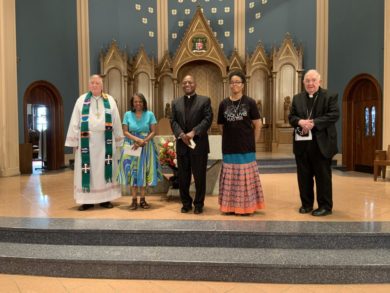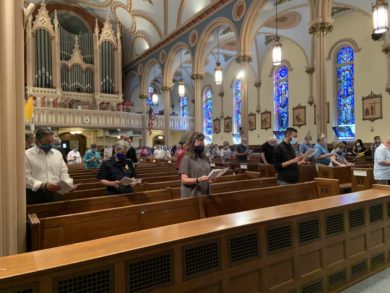June 13, 2020
Archbishop Rozanski urges change of hearts at Prayer Service for Racial Healing
REGIONAL
Story and photos by Sharon Roulier

Participants in the Prayer Service for Racial Unity were Archbishop Mitchell Rozanski; Marion Johnson; Father Warren Savage; Sister of St. Joseph Melinda Pellerin; and Springfield Bishop Emeritus Timothy McDonnell.
SPRINGFIELD – On the 57th anniversary of the murder of African American civil rights leader Medgar Evers, more than 120 people gathered June 12 at 5 p.m. in St. Michael’s Cathedral for a Prayer Service for Racial Healing.
The prayer service was one of many events throughout the state and the nation that have followed the May 25 death of George Floyd, an African American man killed by a Minneapolis police officer who knelt on Floyd’s neck for nearly nine minutes.
The service was led by Archbishop-designate Mitchell T. Rozanski, apostolic administrator of the Diocese of Springfield, who said in his homily that Evers, who was murdered by white supremist Byron De La Beckwith in the driveway outside Evers’ home in Jackson, Miss., was “not willing to stand with the status quo.”
The archbishop said he wondered if, in the nearly six decades since Evers’ death, progress has been made to eliminate racial injustice.
“Have we come any further in the struggle?” he asked, noting that, indeed, laws have been written ending discrimination.
“We realize it’s not changing of laws that help us address problems of racism in our nation and our world, but it is the change of heart,” he said, looking toward a crucifix of Jesus in the cathedral, saying that “we can’t look upon this crucifix and let our lives go on as they are.”
The bishop urged participants to take the cross of Jesus out into the communities to work on converting the hearts of others.

Participants in the prayer service included Springfield Mayor Domenic Sarno (left) and Springfield Police Commissioner Cheryl Clapprood (second from left).
“If we truly believe what we read in the pages of Scripture, we cannot ignore the cross, its message and all its implications,” he said. “It is a sign, not of despair, but one of love and hope.”
The service began with the singing of “There is a Balm in Gilead.”
“Black slaves in bondage understood that balm,” said Sister of St. Joseph Melinda Pellerin, pastoral minister at Holy Name Parish in Springfield, one of the organizers of the prayer service.
“In order to heal, all Catholics must acknowledge white privilege, the original sin of racism in our country, to pray, to reflect and to dialogue with black and brown people in order to heal. That requires a commitment to being like Jesus and modeling Jesus’ life,” she said.
Sister Pellerin also noted that Pope Francis has called on all Catholics to stand up against racial injustice.
“I am happy to see the leader of the Catholic Church urging us to look at racism as a pro-life issue, because it is,” she said.
“Many years ago when we demonstrated in Springfield, I slept on the City Hall steps. I marched in the march. I went door to door collecting money to get people out of jail. And now here it is 50 years later and we’re doing the same thing,” said Marion Johnson, administrative director of the Springfield Diocese’s Black Catholic Apostolate.
“I’m sorry to see that but I have more hope this time, because I see so many more people participating,” said Johnson.
“It’s hard to deal with, very hard to deal with,” said Johnson. “You just try not to lose hope. You just keep praying.”

“I think this time we’re seeing so many more voices than we used to hear and people are just right out there in front and they’re not afraid to say what they feel or what they believe and that’s very encouraging,” said Johnson.
In an interview following the prayer service, organizer Father Warren Savage, Catholic chaplain and director of the Albert and Amelia Ferst Interfaith Center at Westfield State University, said, “Everybody needs to know that we have the power within us to change the world. God has given everybody the power to love.”
“The purpose of God’s coming into the world was to love the world back into wholeness,” he said.
“My only recommendation is that we trust the love that’s already in us to heal all that’s broken, all that’s disordered in the world,” said Father Savage. “The second thing we have to do is call people together so we can do it together because we cannot do it alone. We can only do it together.
“So the most significant challenge today is to not ignore the social distancing caused by COVID-19, but to ignore the social distancing that is created because we just don’t like one another,” he said. “Because, ultimately, that’s where we’re all supposed to end up, back home with God.”


 Facebook
Facebook Youtube
Youtube
